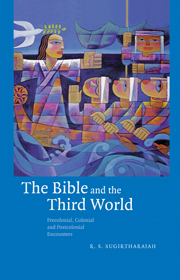Book contents
- Frontmatter
- Contents
- Acknowledgements
- 1 Introduction
- PART I PRECOLONIAL RECEPTION
- PART II COLONIAL EMBRACE
- 2 White men bearing gifts: diffusion of the Bible and scriptural imperialism
- 3 Reading back: resistance as a discursive practice
- 4 The colonialist as a contentious reader: Colenso and his hermeneutics
- 5 Textual pedlars: distributing salvation – colporteurs and their portable Bibles
- PART III POSTCOLONIAL RECLAMATIONS
- Afterword
- Select bibliography
- Index of biblical references
- Index of names and subjects
4 - The colonialist as a contentious reader: Colenso and his hermeneutics
Published online by Cambridge University Press: 02 December 2009
- Frontmatter
- Contents
- Acknowledgements
- 1 Introduction
- PART I PRECOLONIAL RECEPTION
- PART II COLONIAL EMBRACE
- 2 White men bearing gifts: diffusion of the Bible and scriptural imperialism
- 3 Reading back: resistance as a discursive practice
- 4 The colonialist as a contentious reader: Colenso and his hermeneutics
- 5 Textual pedlars: distributing salvation – colporteurs and their portable Bibles
- PART III POSTCOLONIAL RECLAMATIONS
- Afterword
- Select bibliography
- Index of biblical references
- Index of names and subjects
Summary
A bishop there was of Natal
Who took a Zulu for a pal
Said the Kafir ‘look’ ere
Ain't the Pentateuch queer?'
And Converted the Lord of Natal
A nineteenth-century popular verseThe cultural and hermeneutical interaction between the colonizer and the colonized is a complex one. In examining this interaction, colonial discourses often tend to explore the ambivalence and anxiety of the colonized. The last chapter was an example of this. An under-examined aspect of this encounter is the nature of the response of the colonizer. However imperialist and hegemonic the colonizer's role may be, his perception is often sharpened and interrogated by the experience of the colonized Other. Ashis Nandy, the Indian social scientist, in his study of the impact of colonialism on the colonizer, has identified four such reactions: sanctification of institutionalized violence; production of a false sense of cultural homogeneity in colonizing societies; encouragement of religious and ethical theories as part of the colonial project; and imputation of permanence and omnipotency to the colonizer. A rare fifth case involves opting out of the colonial framework and positioning oneself against the hegemonic and expanding discourse of the time. This chapter will consider an example of this last reaction – a model of dissent, exercised in this case by a missionary bishop who engaged in an imaginative hermeneutical and political enterprise, modified and controlled by a colonial mode of thinking.
- Type
- Chapter
- Information
- The Bible and the Third WorldPrecolonial, Colonial and Postcolonial Encounters, pp. 110 - 139Publisher: Cambridge University PressPrint publication year: 2001



